
unstract
No-code LLM Platform to launch APIs and ETL Pipelines to structure unstructured documents
Stars: 6444
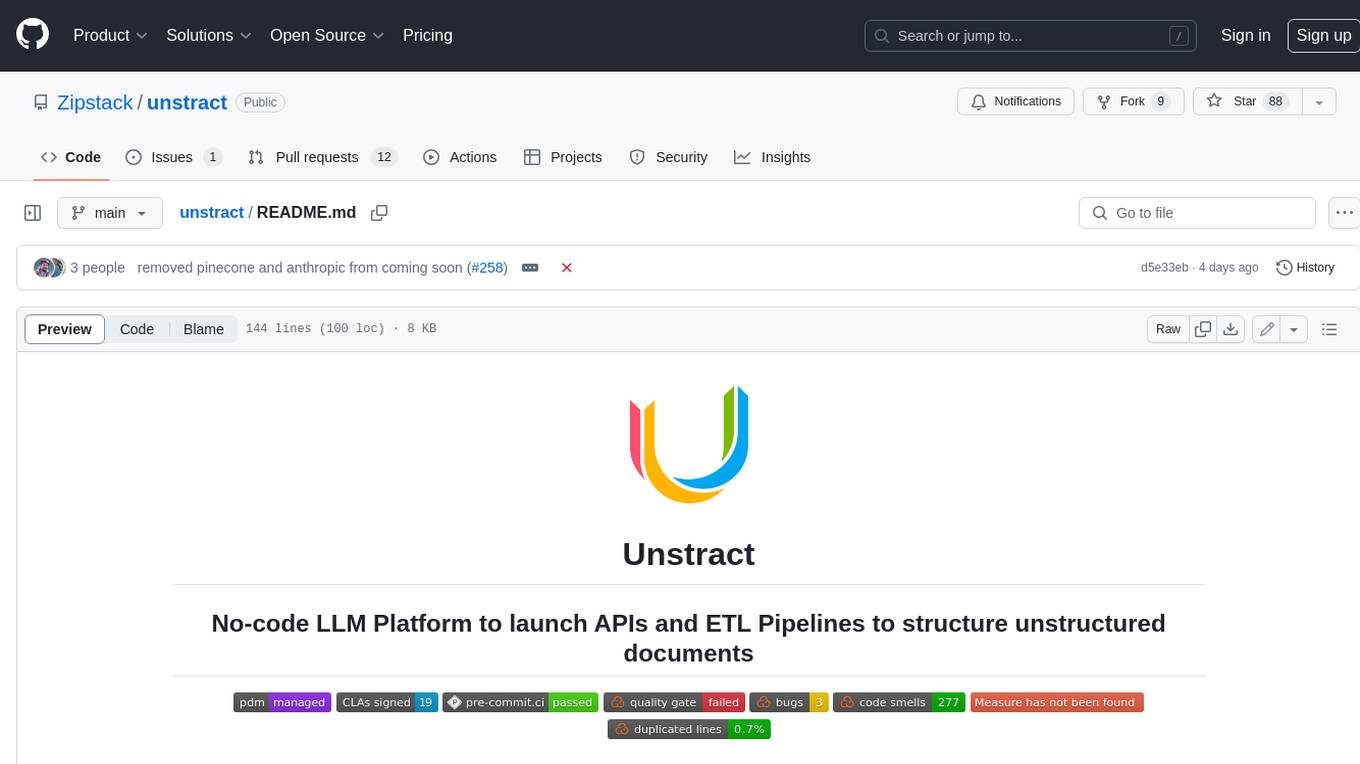
Unstract is a no-code platform that enables users to launch APIs and ETL pipelines to structure unstructured documents. With Unstract, users can go beyond co-pilots by enabling machine-to-machine automation. Unstract's Prompt Studio provides a simple, no-code approach to creating prompts for LLMs, vector databases, embedding models, and text extractors. Users can then configure Prompt Studio projects as API deployments or ETL pipelines to automate critical business processes that involve complex documents. Unstract supports a wide range of LLM providers, vector databases, embeddings, text extractors, ETL sources, and ETL destinations, providing users with the flexibility to choose the best tools for their needs.
README:

Prompt Studio is a purpose-built environment that supercharges your schema definition efforts. Compare outputs from different LLMs side-by-side, keep tab on costs while you develop generic prompts that work across wide-ranging document variations. And when you're ready, launch extraction APIs with a single click.
Once you've used Prompt Studio to define your schema, Unstract makes it easy to integrate into your existing workflows. Simply choose the integration type that best fits your environment:
| Integration Type | Description | Best For | Documentation |
|---|---|---|---|
| 🖥️ MCP Servers | Run Unstract as an MCP Server to provide structured data extraction to Agents or LLMs in your ecosystem. | Developers building Agentic/LLM apps/tools that speak MCP. | Unstract MCP Server Docs |
| 🌐 API Deployments | Turn any document into JSON with an API call. Deploy any Prompt Studio project as a REST API endpoint with a single click. | Teams needing programmatic access in apps, services, or custom tooling. | API Deployment Docs |
| ⚙️ ETL Pipelines | Embed Unstract directly into your ETL jobs to transform unstructured data before loading it into your warehouse / database. | Engineering and Data engineering teams that need to batch process documents into clean JSON. | ETL Pipelines Docs |
| 🧩 n8n Nodes | Use Unstract as ready-made nodes in n8n workflows for drag-and-drop automation. | Low-code users and ops teams automating workflows. | Unstract n8n Nodes Docs |
The easy-peasy way to try Unstract is to sign up for a 14-day free trial. Give Unstract a spin now!
Unstract Cloud also comes with some really awesome features that give serious accuracy boosts to agentic/LLM-powered document-centric workflows in the enterprise.
| Feature | Description | Documentation |
|---|---|---|
| 🧪 LLMChallenge | Uses two Large Language Models to ensure trustworthy output. You either get the right response or no response at all. | Docs |
| ⚡ SinglePass Extraction | Reduces LLM token usage by up to 8x, dramatically cutting costs. | Docs |
| 📉 SummarizedExtraction | Reduces LLM token usage by up to 6x, saving costs while keeping accuracy. | Docs |
| 👀 Human-In-The-Loop | Side-by-side comparison of extracted value and source document, with highlighting for human review and tweaking. | Docs |
| 🔐 SSO Support | Enterprise-ready authentication options for seamless onboarding and off-boarding. | Docs |
Unstract comes well documented. You can get introduced to the basics of Unstract, and learn how to connect various systems like LLMs, Vector Databases, Embedding Models and Text Extractors to it. The easiest way to wet your feet is to go through our Quick Start Guide where you actually get to do some prompt engineering in Prompt Studio and launch an API to structure varied credit card statements!
- 8GB RAM (minimum)
- Linux or MacOS (Intel or M-series)
- Docker
- Docker Compose (if you need to install it separately)
- Git
Next, either download a release or clone this repo and do the following:
✅ ./run-platform.sh
✅ Now visit http://frontend.unstract.localhost in your browser
✅ Use username and password unstract to login
That's all there is to it!
Follow these steps to change the default username and password. See user guide for more details on managing the platform.
Another really quick way to experience Unstract is by signing up for our hosted version. It comes with a 14 day free trial!
Unstract supports a wide range of file formats for document processing:
| Category | Format | Description |
|---|---|---|
| Word Processing | DOCX | Microsoft Word Open XML |
| DOC | Microsoft Word | |
| ODT | OpenDocument Text | |
| Presentation | PPTX | Microsoft PowerPoint Open XML |
| PPT | Microsoft PowerPoint | |
| ODP | OpenDocument Presentation | |
| Spreadsheet | XLSX | Microsoft Excel Open XML |
| XLS | Microsoft Excel | |
| ODS | OpenDocument Spreadsheet | |
| Document & Text | Portable Document Format | |
| TXT | Plain Text | |
| CSV | Comma-Separated Values | |
| JSON | JavaScript Object Notation | |
| Image | BMP | Bitmap Image |
| GIF | Graphics Interchange Format | |
| JPEG | Joint Photographic Experts Group | |
| JPG | Joint Photographic Experts Group | |
| PNG | Portable Network Graphics | |
| TIF | Tagged Image File Format | |
| TIFF | Tagged Image File Format | |
| WEBP | Web Picture Format |
| Provider | Status | |
|---|---|---|
| Qdrant | ✅ Working | |
| Weaviate | ✅ Working | |
| Pinecone | ✅ Working | |
| PostgreSQL | ✅ Working | |
| Milvus | ✅ Working |
| Provider | Status | |
|---|---|---|
| OpenAI | ✅ Working | |
| Azure OpenAI | ✅ Working | |
| Google PaLM | ✅ Working | |
| Ollama | ✅ Working | |
| VertexAI | ✅ Working | |
| Bedrock | ✅ Working |
| Provider | Status | |
|---|---|---|
| Unstract LLMWhisperer V2 | ✅ Working | |
| Unstructured.io Community | ✅ Working | |
| Unstructured.io Enterprise | ✅ Working | |
| LlamaIndex Parse | ✅ Working |
| Provider | Status | |
|---|---|---|
| AWS S3 | ✅ Working | |
| MinIO | ✅ Working | |
| Google Cloud Storage | ✅ Working | |
| Azure Cloud Storage | ✅ Working | |
| Google Drive | ✅ Working | |
| Dropbox | ✅ Working | |
| SFTP | ✅ Working |
| Provider | Status | |
|---|---|---|
| Snowflake | ✅ Working | |
| Amazon Redshift | ✅ Working | |
| Google BigQuery | ✅ Working | |
| PostgreSQL | ✅ Working | |
| MySQL | ✅ Working | |
| MariaDB | ✅ Working | |
| Microsoft SQL Server | ✅ Working | |
| Oracle | ✅ Working |
Contributions are welcome! Please see CONTRIBUTING.md for further details to get started easily.
- On Slack, join great conversations around LLMs, their ecosystem and leveraging them to automate the previously unautomatable!
- Follow us on X/Twitter
- Follow us on LinkedIn
Do copy the value of ENCRYPTION_KEY config in either backend/.env or platform-service/.env file to a secure location.
Adapter credentials are encrypted by the platform using this key. Its loss or change will make all existing adapters inaccessible!
In full disclosure, Unstract integrates Posthog to track usage analytics. As you can inspect the relevant code here, we collect the minimum possible metrics. Posthog can be disabled if desired by setting REACT_APP_ENABLE_POSTHOG to false in the frontend's .env file.
For Tasks:
Click tags to check more tools for each tasksFor Jobs:
Alternative AI tools for unstract
Similar Open Source Tools

unstract
Unstract is a no-code platform that enables users to launch APIs and ETL pipelines to structure unstructured documents. With Unstract, users can go beyond co-pilots by enabling machine-to-machine automation. Unstract's Prompt Studio provides a simple, no-code approach to creating prompts for LLMs, vector databases, embedding models, and text extractors. Users can then configure Prompt Studio projects as API deployments or ETL pipelines to automate critical business processes that involve complex documents. Unstract supports a wide range of LLM providers, vector databases, embeddings, text extractors, ETL sources, and ETL destinations, providing users with the flexibility to choose the best tools for their needs.
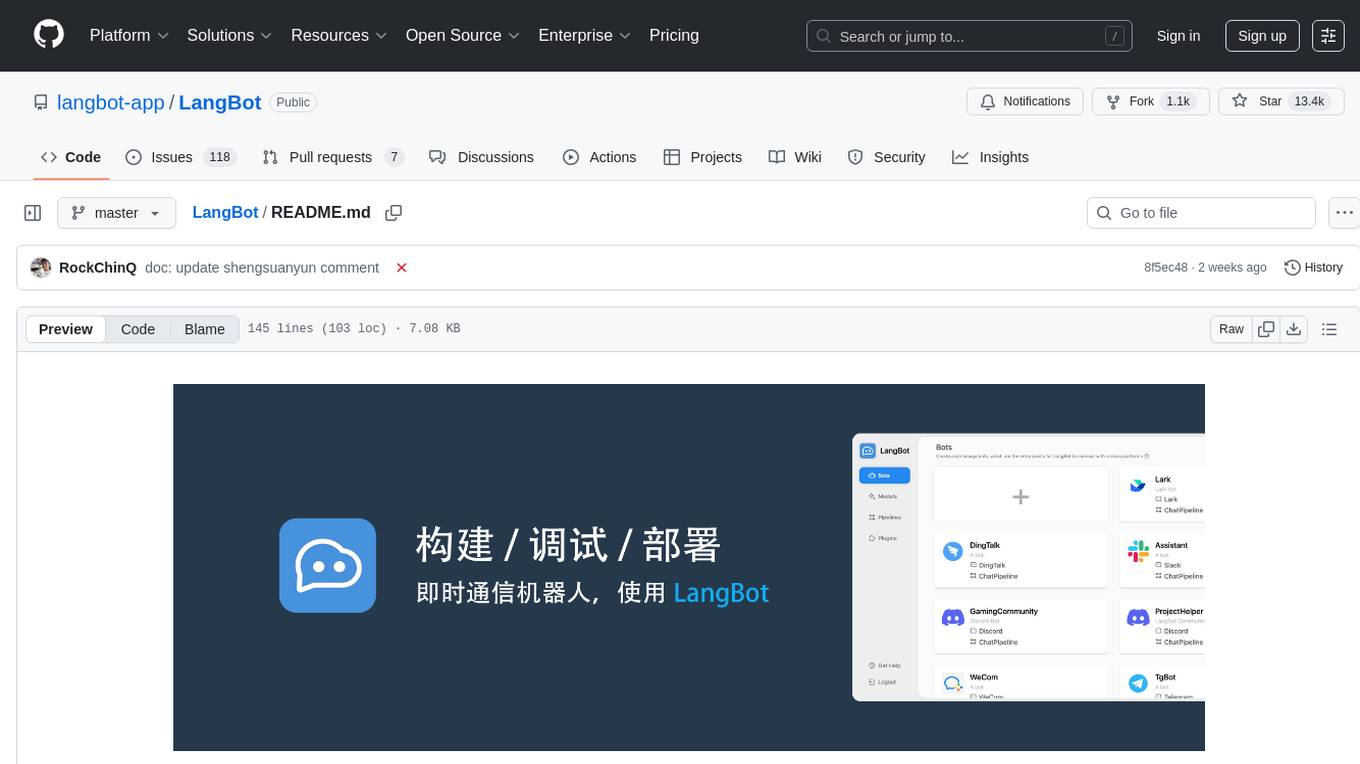
LangBot
LangBot is an open-source large language model native instant messaging robot development platform, aiming to provide a plug-and-play IM robot development experience, with various LLM application functions such as Agent, RAG, MCP, adapting to mainstream instant messaging platforms globally, and providing rich API interfaces to support custom development.
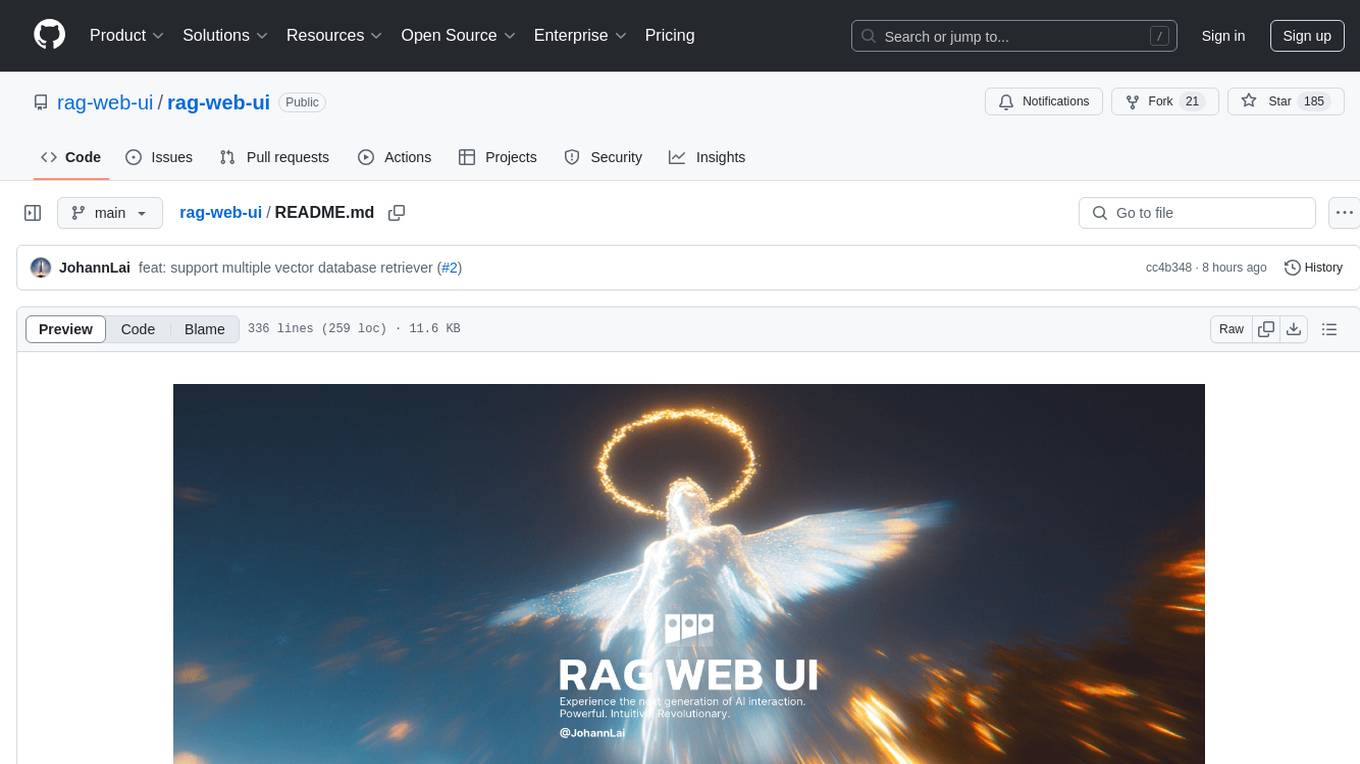
rag-web-ui
RAG Web UI is an intelligent dialogue system based on RAG (Retrieval-Augmented Generation) technology. It helps enterprises and individuals build intelligent Q&A systems based on their own knowledge bases. By combining document retrieval and large language models, it delivers accurate and reliable knowledge-based question-answering services. The system is designed with features like intelligent document management, advanced dialogue engine, and a robust architecture. It supports multiple document formats, async document processing, multi-turn contextual dialogue, and reference citations in conversations. The architecture includes a backend stack with Python FastAPI, MySQL + ChromaDB, MinIO, Langchain, JWT + OAuth2 for authentication, and a frontend stack with Next.js, TypeScript, Tailwind CSS, Shadcn/UI, and Vercel AI SDK for AI integration. Performance optimization includes incremental document processing, streaming responses, vector database performance tuning, and distributed task processing. The project is licensed under the Apache-2.0 License and is intended for learning and sharing RAG knowledge only, not for commercial purposes.
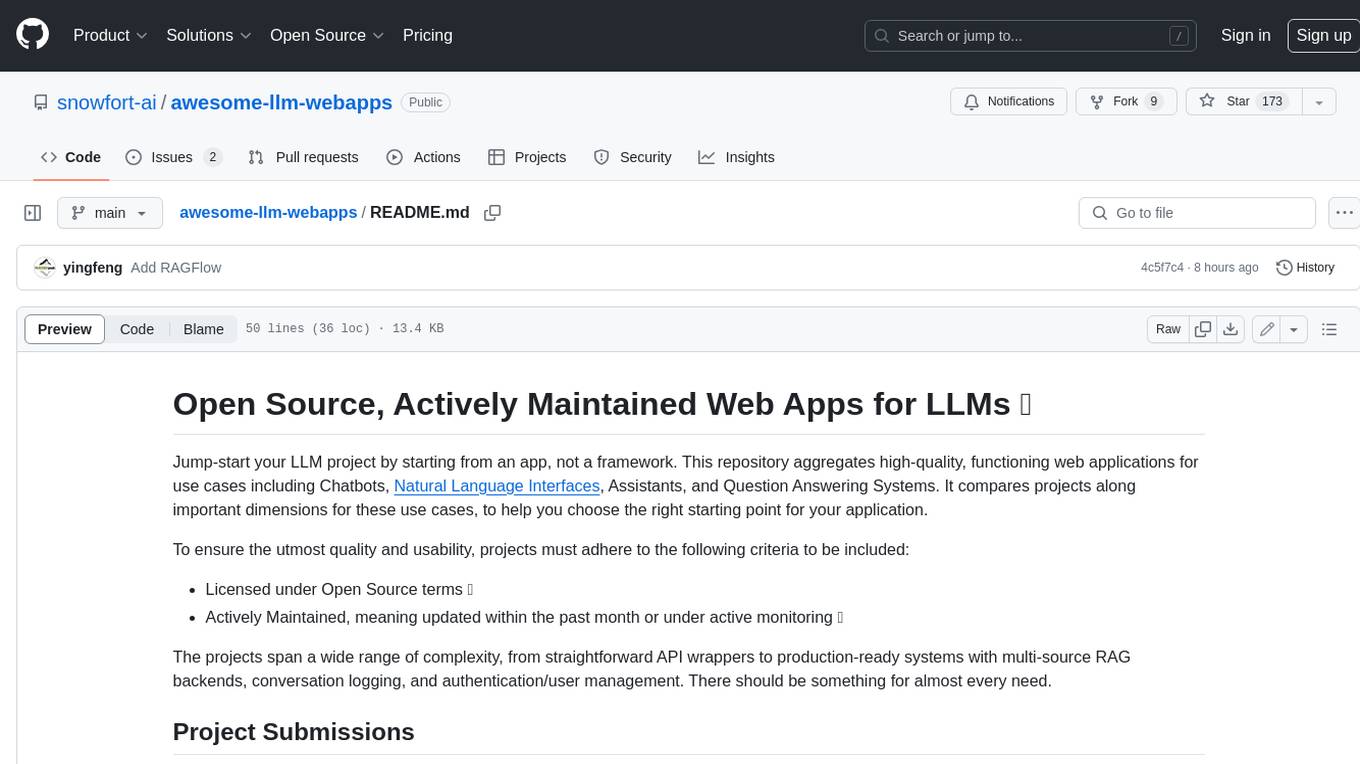
awesome-llm-webapps
This repository is a curated list of open-source, actively maintained web applications that leverage large language models (LLMs) for various use cases, including chatbots, natural language interfaces, assistants, and question answering systems. The projects are evaluated based on key criteria such as licensing, maintenance status, complexity, and features, to help users select the most suitable starting point for their LLM-based applications. The repository welcomes contributions and encourages users to submit projects that meet the criteria or suggest improvements to the existing list.
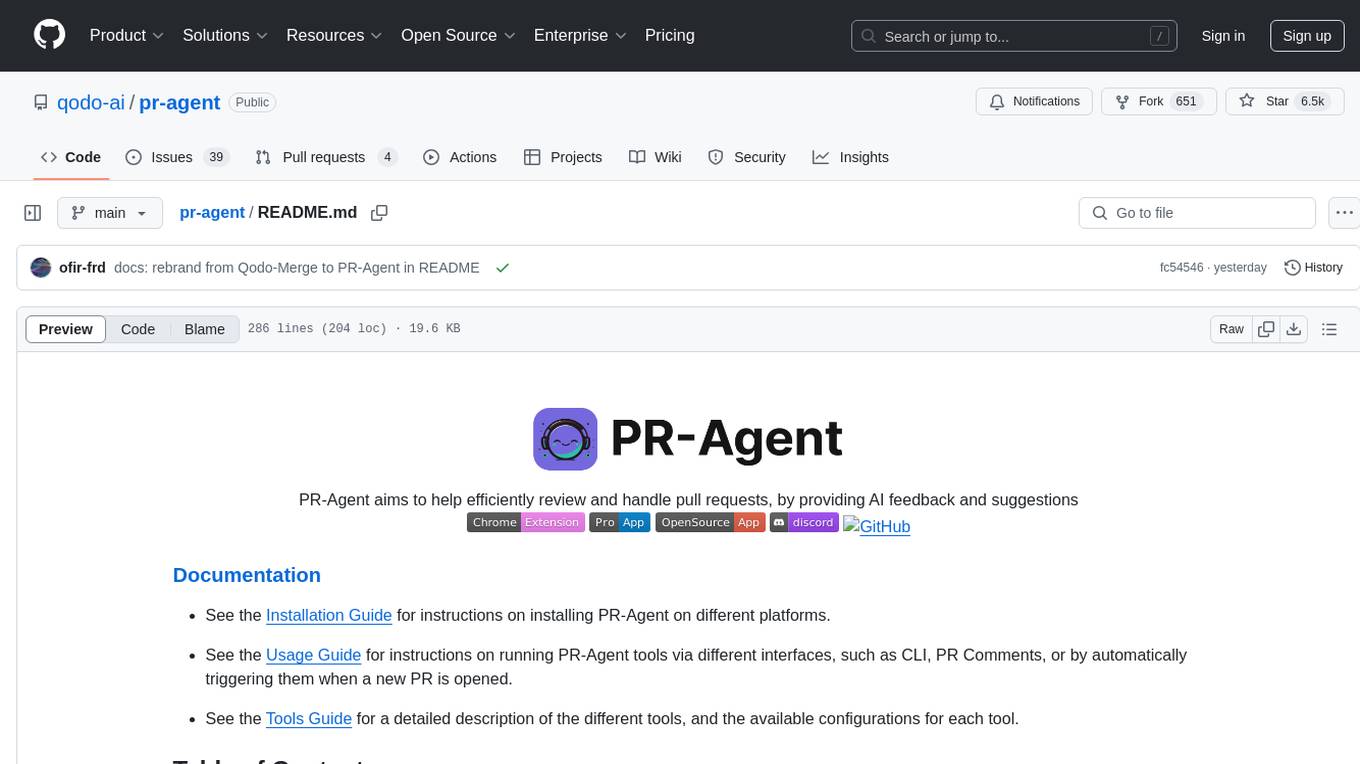
pr-agent
PR-Agent is a tool designed to assist in efficiently reviewing and handling pull requests by providing AI feedback and suggestions. It offers various tools such as Review, Describe, Improve, Ask, Update CHANGELOG, and more, with the ability to run them via different interfaces like CLI, PR Comments, or automatically triggering them when a new PR is opened. The tool supports multiple git platforms and models, emphasizing real-life practical usage and modular, customizable tools.
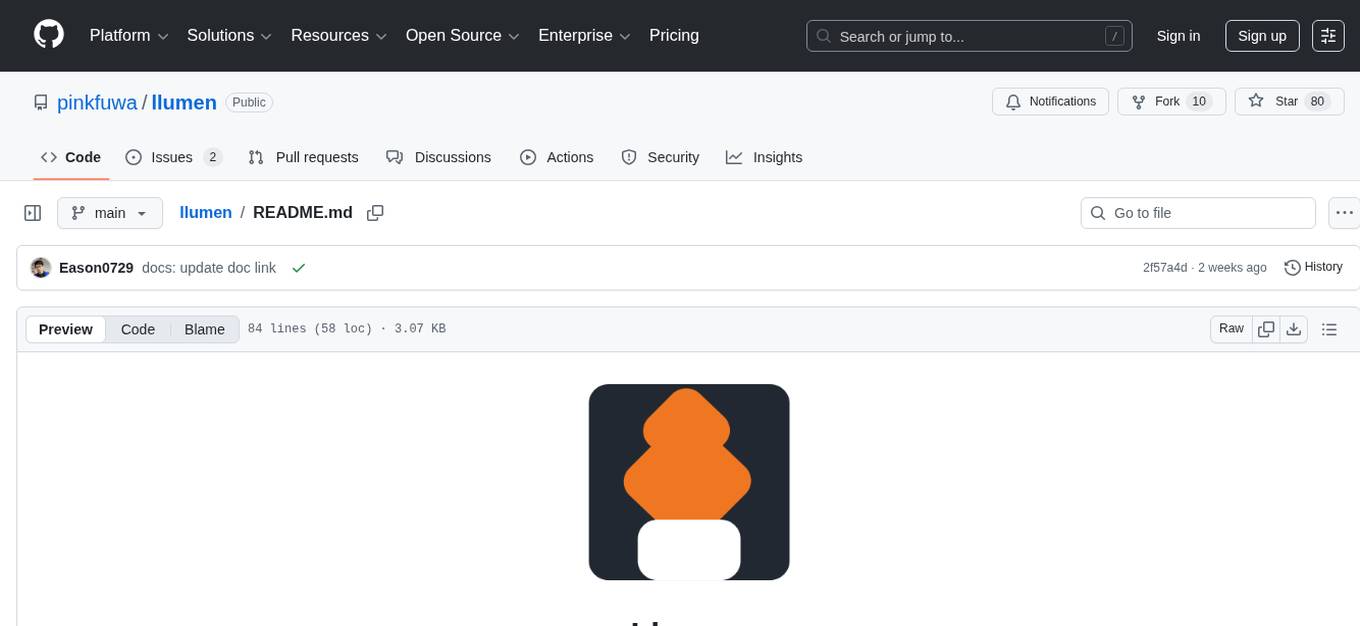
llumen
Llumen is a self-hosted interface optimized for modest hardware like Raspberry Pi, old laptops, and minimal VPS. It offers privacy without complexity, providing essential features with minimal resource demands. Users can enjoy sub-second cold starts, real-time token streaming, various chat modes, rich media support, and a universal API for OpenAI-compatible providers. The tool has a small footprint with a binary size of around 17MB and RAM usage under 128MB. Llumen aims to simplify the setup process and offer a user-friendly experience for individuals seeking a privacy-focused solution.
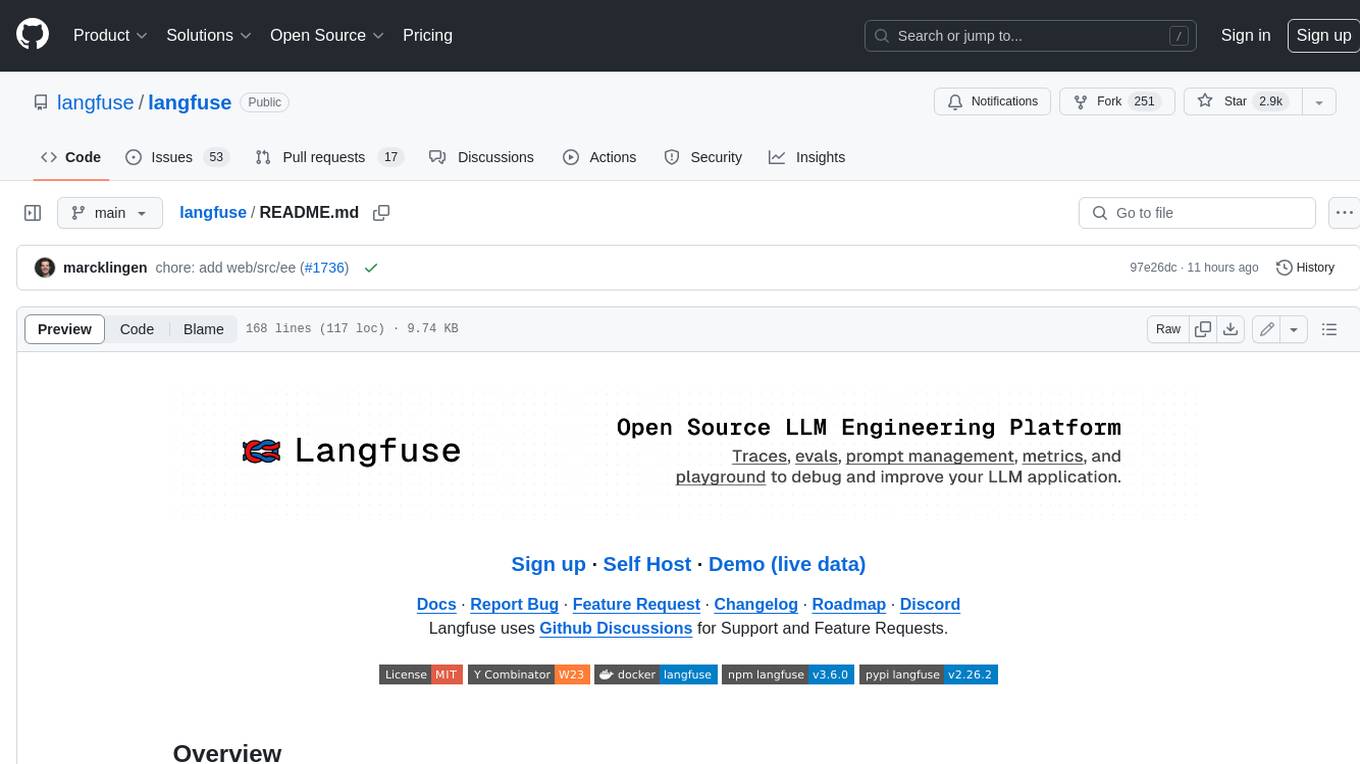
langfuse
Langfuse is a powerful tool that helps you develop, monitor, and test your LLM applications. With Langfuse, you can: * **Develop:** Instrument your app and start ingesting traces to Langfuse, inspect and debug complex logs, and manage, version, and deploy prompts from within Langfuse. * **Monitor:** Track metrics (cost, latency, quality) and gain insights from dashboards & data exports, collect and calculate scores for your LLM completions, run model-based evaluations, collect user feedback, and manually score observations in Langfuse. * **Test:** Track and test app behaviour before deploying a new version, test expected in and output pairs and benchmark performance before deploying, and track versions and releases in your application. Langfuse is easy to get started with and offers a generous free tier. You can sign up for Langfuse Cloud or deploy Langfuse locally or on your own infrastructure. Langfuse also offers a variety of integrations to make it easy to connect to your LLM applications.
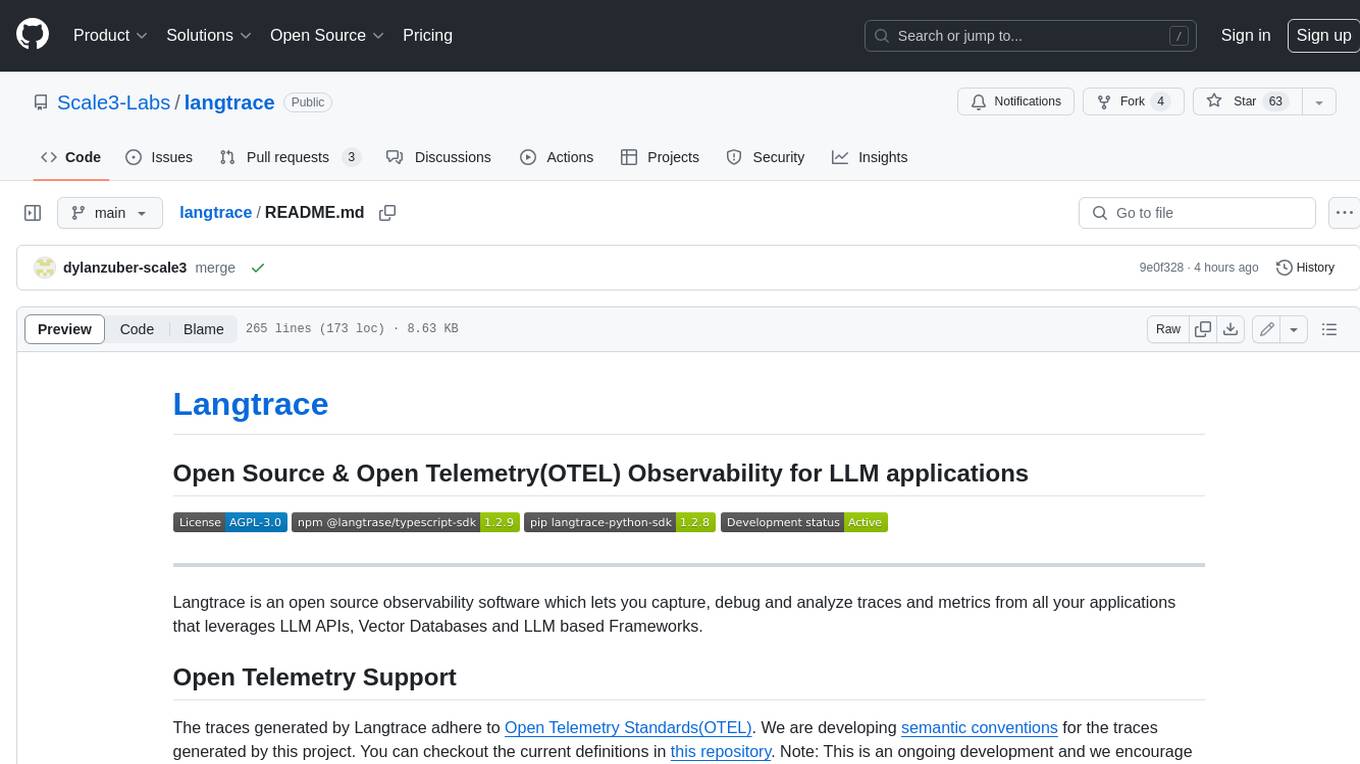
langtrace
Langtrace is an open source observability software that lets you capture, debug, and analyze traces and metrics from all your applications that leverage LLM APIs, Vector Databases, and LLM-based Frameworks. It supports Open Telemetry Standards (OTEL), and the traces generated adhere to these standards. Langtrace offers both a managed SaaS version (Langtrace Cloud) and a self-hosted option. The SDKs for both Typescript/Javascript and Python are available, making it easy to integrate Langtrace into your applications. Langtrace automatically captures traces from various vendors, including OpenAI, Anthropic, Azure OpenAI, Langchain, LlamaIndex, Pinecone, and ChromaDB.
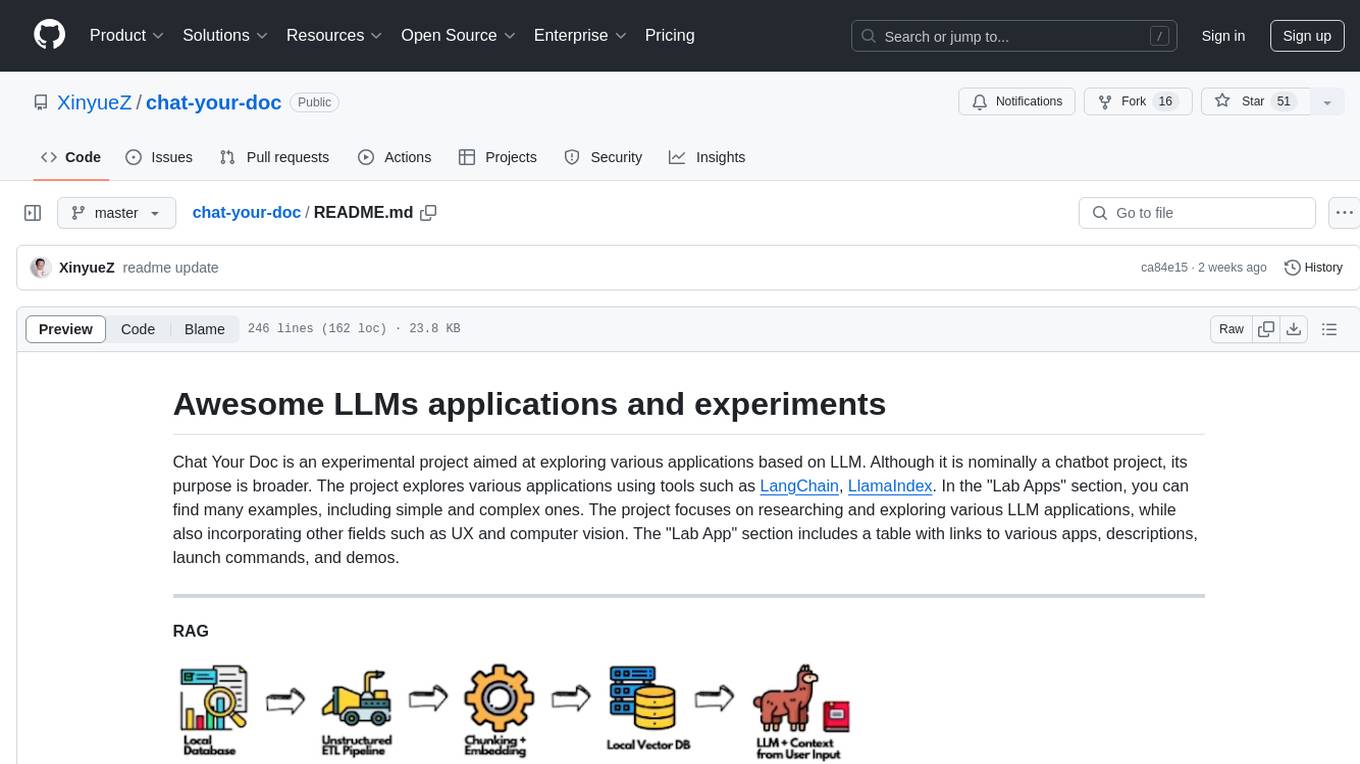
chat-your-doc
Chat Your Doc is an experimental project exploring various applications based on LLM technology. It goes beyond being just a chatbot project, focusing on researching LLM applications using tools like LangChain and LlamaIndex. The project delves into UX, computer vision, and offers a range of examples in the 'Lab Apps' section. It includes links to different apps, descriptions, launch commands, and demos, aiming to showcase the versatility and potential of LLM applications.
gpupixel
GPUPixel is a real-time, high-performance image and video filter library written in C++11 and based on OpenGL/ES. It incorporates a built-in beauty face filter that achieves commercial-grade beauty effects. The library is extremely easy to compile and integrate with a small size, supporting platforms including iOS, Android, Mac, Windows, and Linux. GPUPixel provides various filters like skin smoothing, whitening, face slimming, big eyes, lipstick, and blush. It supports input formats like YUV420P, RGBA, JPEG, PNG, and output formats like RGBA and YUV420P. The library's performance on devices like iPhone and Android is optimized, with low CPU usage and fast processing times. GPUPixel's lib size is compact, making it suitable for mobile and desktop applications.
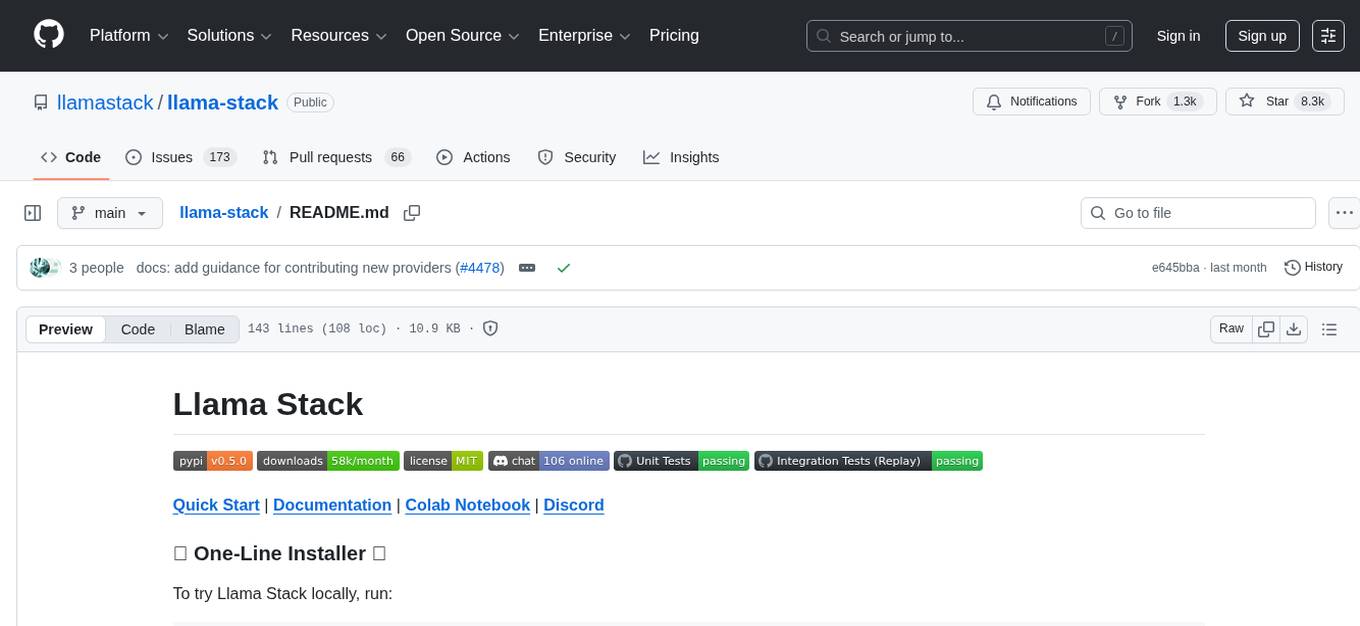
llama-stack
Llama Stack defines and standardizes core building blocks for AI application development, providing a unified API layer, plugin architecture, prepackaged distributions, developer interfaces, and standalone applications. It offers flexibility in infrastructure choice, consistent experience with unified APIs, and a robust ecosystem with integrated distribution partners. The tool simplifies building, testing, and deploying AI applications with various APIs and environments, supporting local development, on-premises, cloud, and mobile deployments.
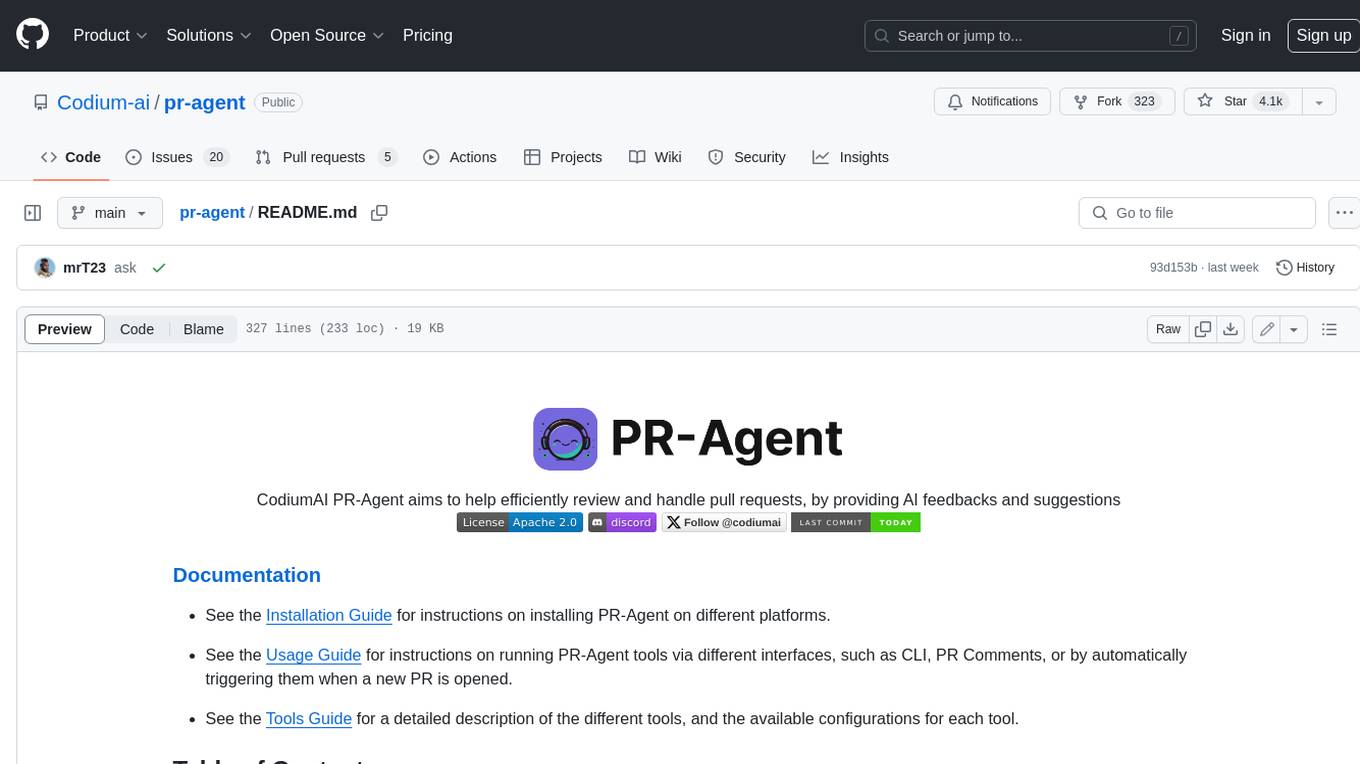
pr-agent
PR-Agent is a tool that helps to efficiently review and handle pull requests by providing AI feedbacks and suggestions. It supports various commands such as generating PR descriptions, providing code suggestions, answering questions about the PR, and updating the CHANGELOG.md file. PR-Agent can be used via CLI, GitHub Action, GitHub App, Docker, and supports multiple git providers and models. It emphasizes real-life practical usage, with each tool having a single GPT-4 call for quick and affordable responses. The PR Compression strategy enables effective handling of both short and long PRs, while the JSON prompting strategy allows for modular and customizable tools. PR-Agent Pro, the hosted version by CodiumAI, provides additional benefits such as full management, improved privacy, priority support, and extra features.
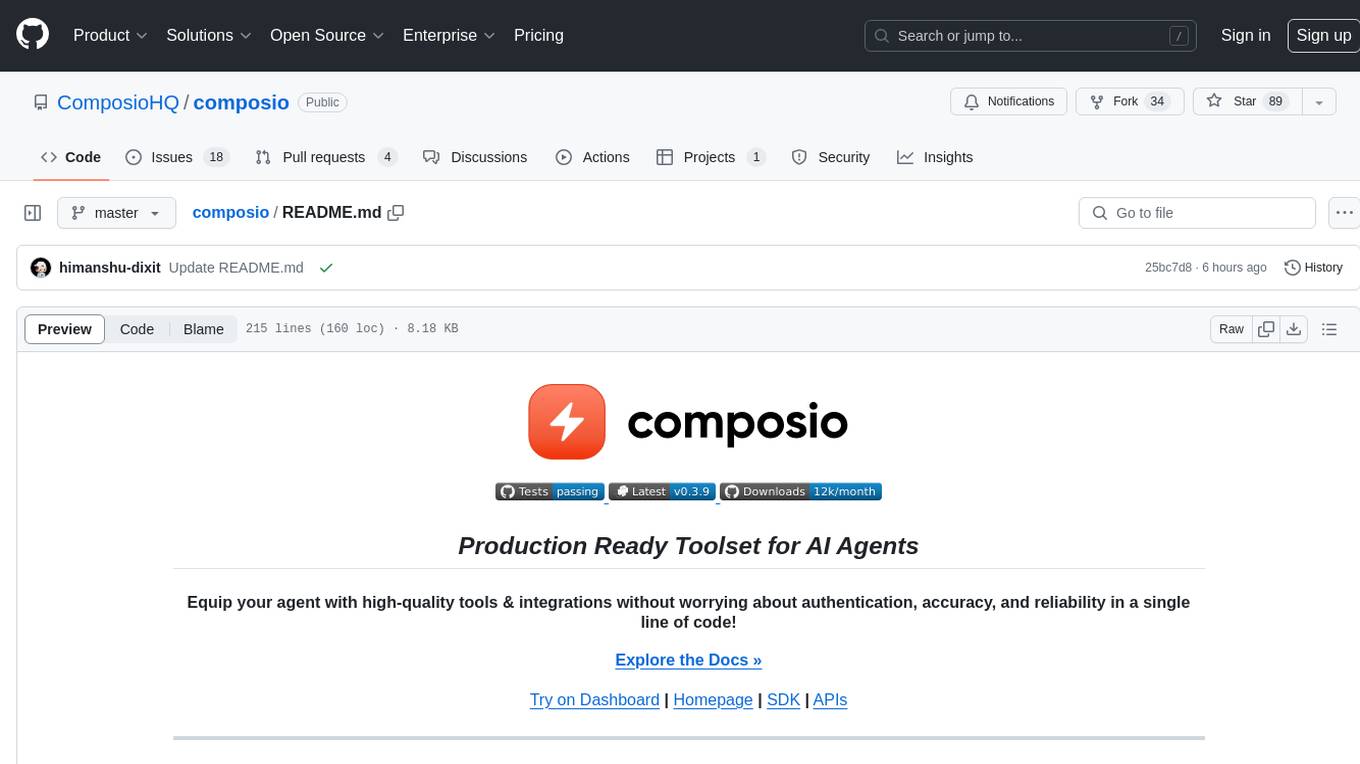
composio
Composio is a production-ready toolset for AI agents that enables users to integrate AI agents with various agentic tools effortlessly. It provides support for over 100 tools across different categories, including popular softwares like GitHub, Notion, Linear, Gmail, Slack, and more. Composio ensures managed authorization with support for six different authentication protocols, offering better agentic accuracy and ease of use. Users can easily extend Composio with additional tools, frameworks, and authorization protocols. The toolset is designed to be embeddable and pluggable, allowing for seamless integration and consistent user experience.
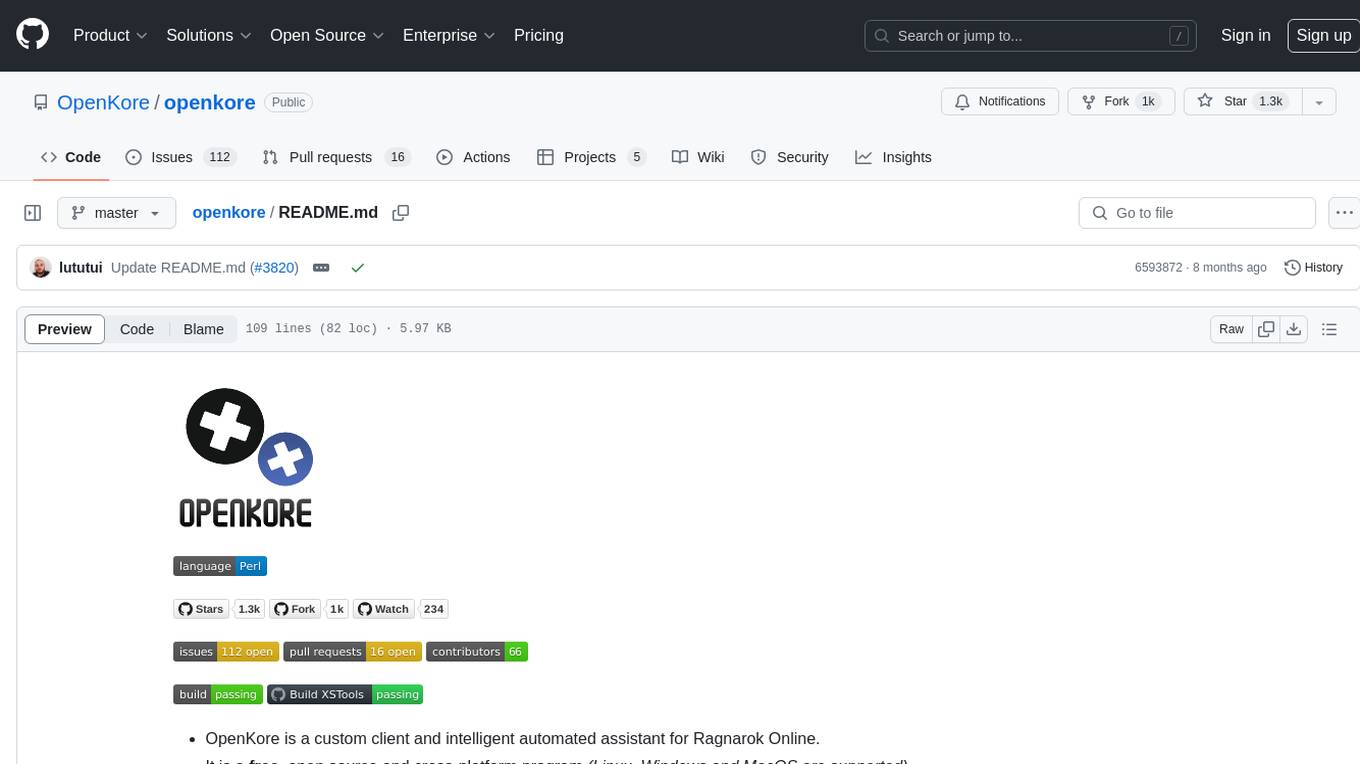
openkore
OpenKore is a custom client and intelligent automated assistant for Ragnarok Online. It is a free, open source, and cross-platform program (Linux, Windows, and MacOS are supported). To run OpenKore, you need to download and extract it or clone the repository using Git. Configure OpenKore according to the documentation and run openkore.pl to start. The tool provides a FAQ section for troubleshooting, guidelines for reporting issues, and information about botting status on official servers. OpenKore is developed by a global team, and contributions are welcome through pull requests. Various community resources are available for support and communication. Users are advised to comply with the GNU General Public License when using and distributing the software.
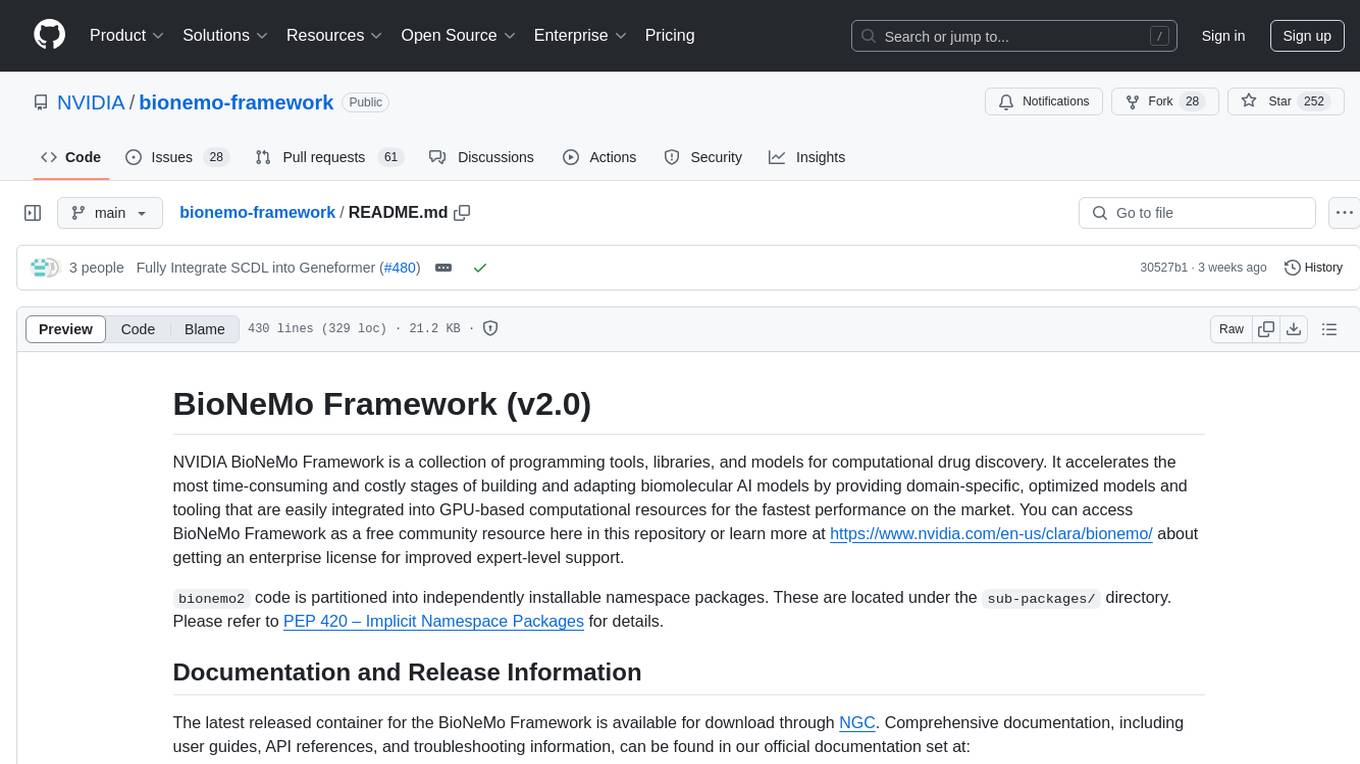
bionemo-framework
NVIDIA BioNeMo Framework is a collection of programming tools, libraries, and models for computational drug discovery. It accelerates building and adapting biomolecular AI models by providing domain-specific, optimized models and tooling for GPU-based computational resources. The framework offers comprehensive documentation and support for both community and enterprise users.
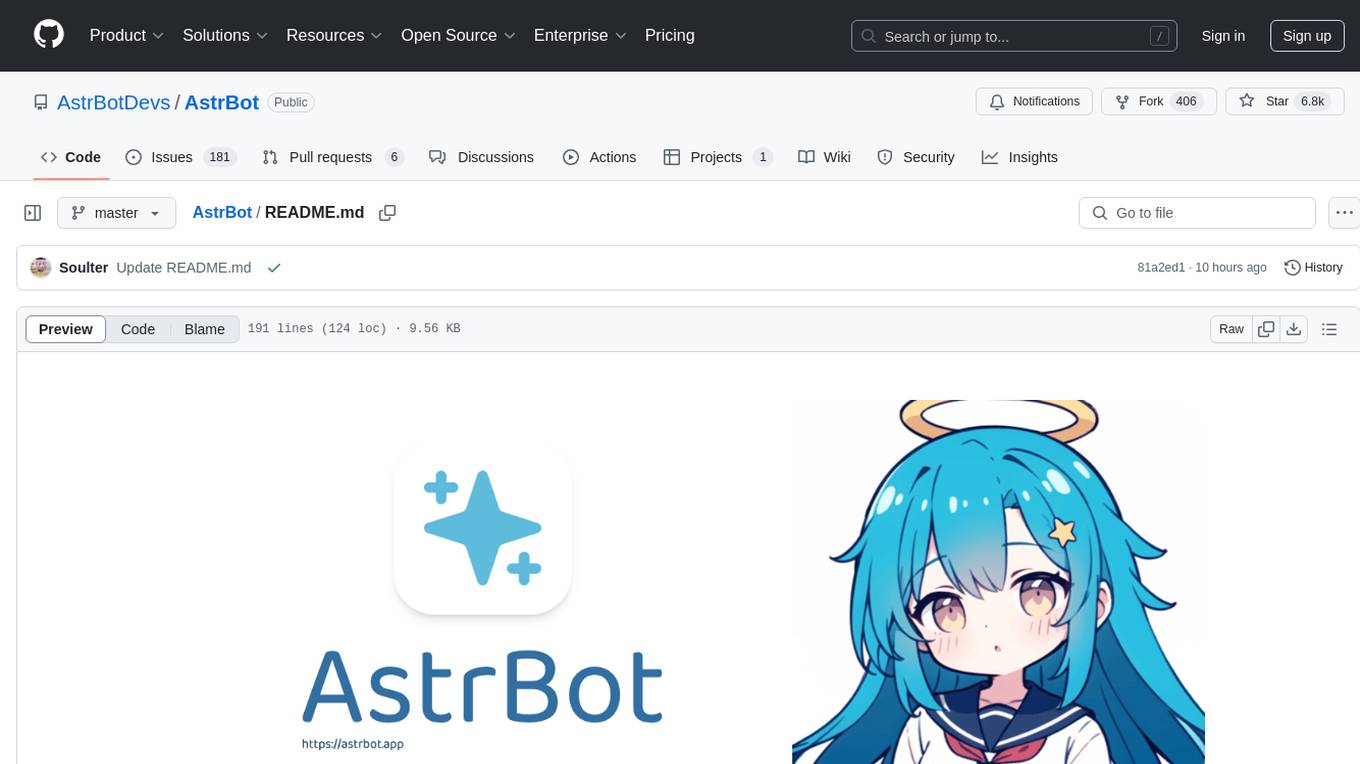
AstrBot
AstrBot is an open-source one-stop Agentic chatbot platform and development framework. It supports large model conversations, multiple messaging platforms, Agent capabilities, plugin extensions, and WebUI for visual configuration and management of the chatbot.
For similar tasks

unstract
Unstract is a no-code platform that enables users to launch APIs and ETL pipelines to structure unstructured documents. With Unstract, users can go beyond co-pilots by enabling machine-to-machine automation. Unstract's Prompt Studio provides a simple, no-code approach to creating prompts for LLMs, vector databases, embedding models, and text extractors. Users can then configure Prompt Studio projects as API deployments or ETL pipelines to automate critical business processes that involve complex documents. Unstract supports a wide range of LLM providers, vector databases, embeddings, text extractors, ETL sources, and ETL destinations, providing users with the flexibility to choose the best tools for their needs.
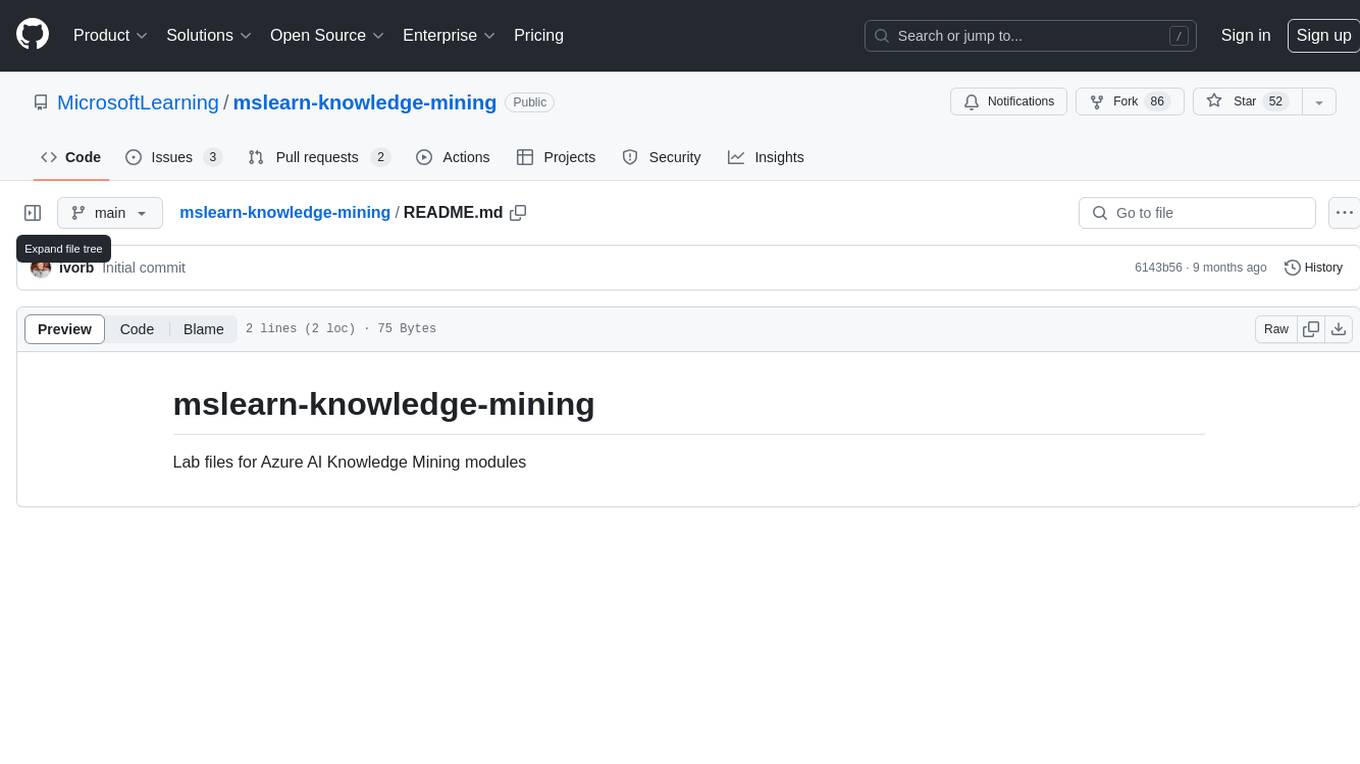
mslearn-knowledge-mining
The mslearn-knowledge-mining repository contains lab files for Azure AI Knowledge Mining modules. It provides resources for learning and implementing knowledge mining techniques using Azure AI services. The repository is designed to help users explore and understand how to leverage AI for knowledge mining purposes within the Azure ecosystem.
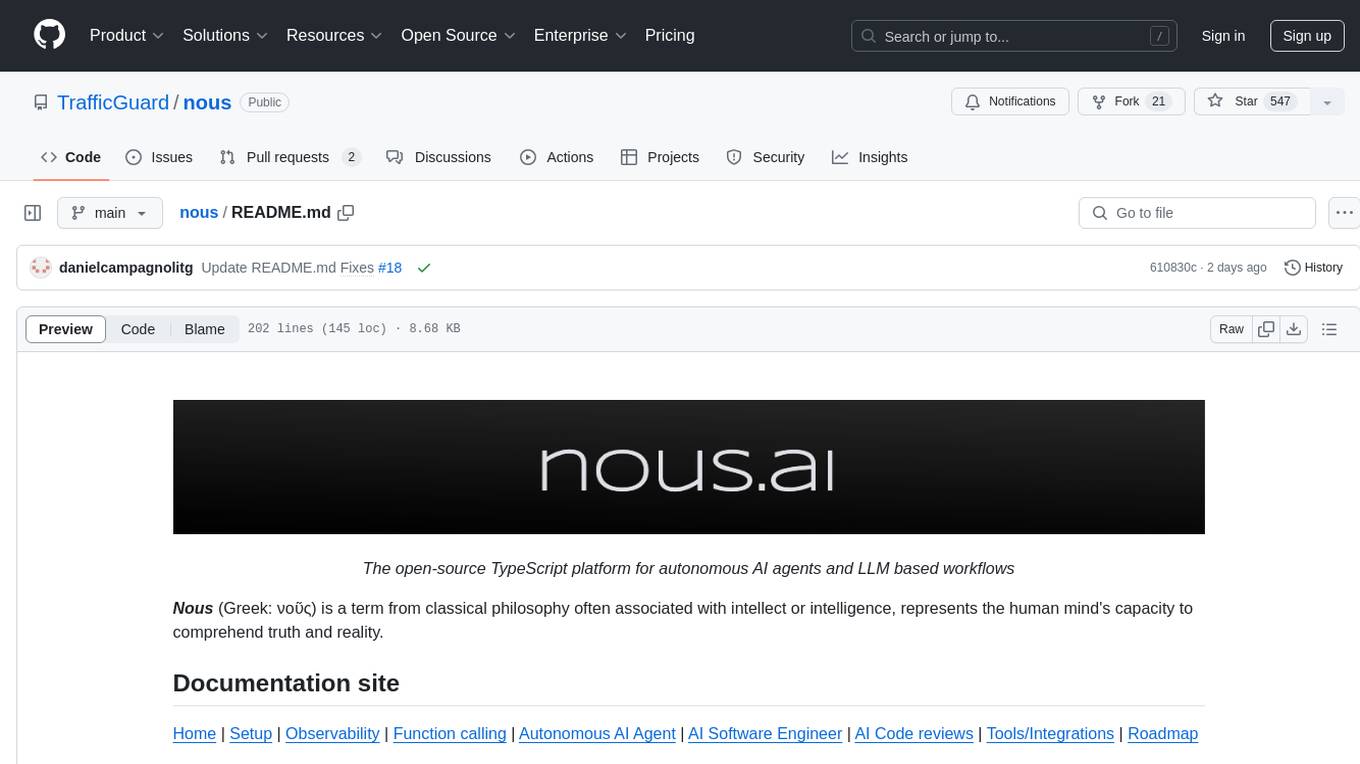
nous
Nous is an open-source TypeScript platform for autonomous AI agents and LLM based workflows. It aims to automate processes, support requests, review code, assist with refactorings, and more. The platform supports various integrations, multiple LLMs/services, CLI and web interface, human-in-the-loop interactions, flexible deployment options, observability with OpenTelemetry tracing, and specific agents for code editing, software engineering, and code review. It offers advanced features like reasoning/planning, memory and function call history, hierarchical task decomposition, and control-loop function calling options. Nous is designed to be a flexible platform for the TypeScript community to expand and support different use cases and integrations.
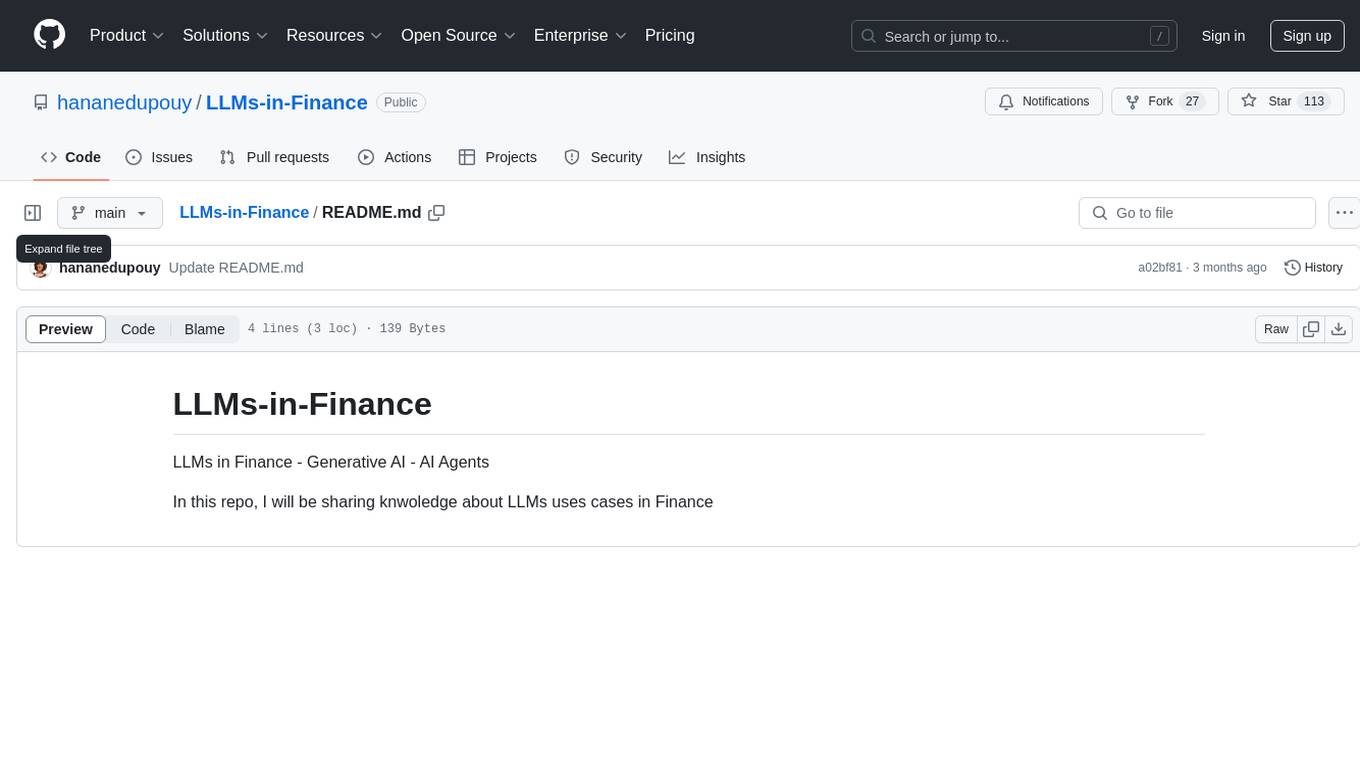
LLMs-in-Finance
This repository focuses on the application of Large Language Models (LLMs) in the field of finance. It provides insights and knowledge about how LLMs can be utilized in various scenarios within the finance industry, particularly in generating AI agents. The repository aims to explore the potential of LLMs to enhance financial processes and decision-making through the use of advanced natural language processing techniques.
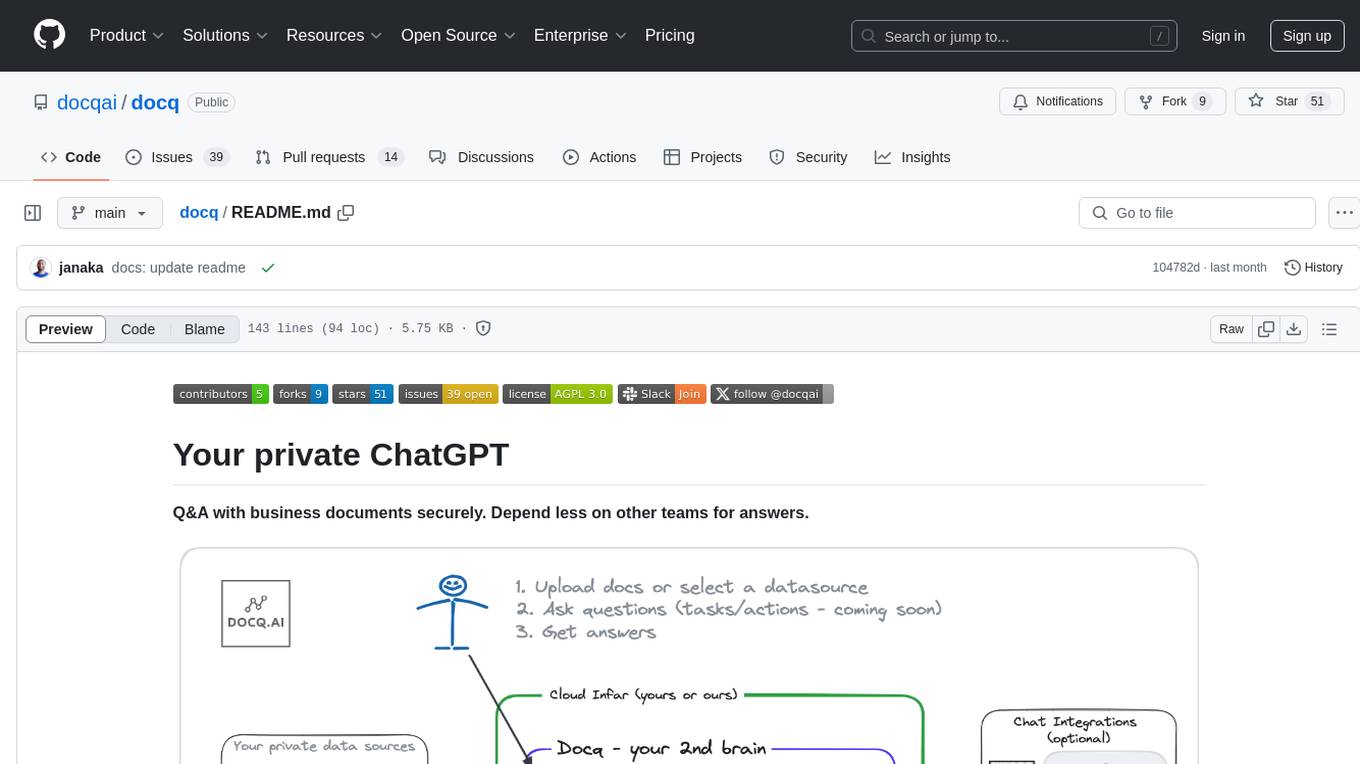
docq
Docq is a private and secure GenAI tool designed to extract knowledge from business documents, enabling users to find answers independently. It allows data to stay within organizational boundaries, supports self-hosting with various cloud vendors, and offers multi-model and multi-modal capabilities. Docq is extensible, open-source (AGPLv3), and provides commercial licensing options. The tool aims to be a turnkey solution for organizations to adopt AI innovation safely, with plans for future features like more data ingestion options and model fine-tuning.
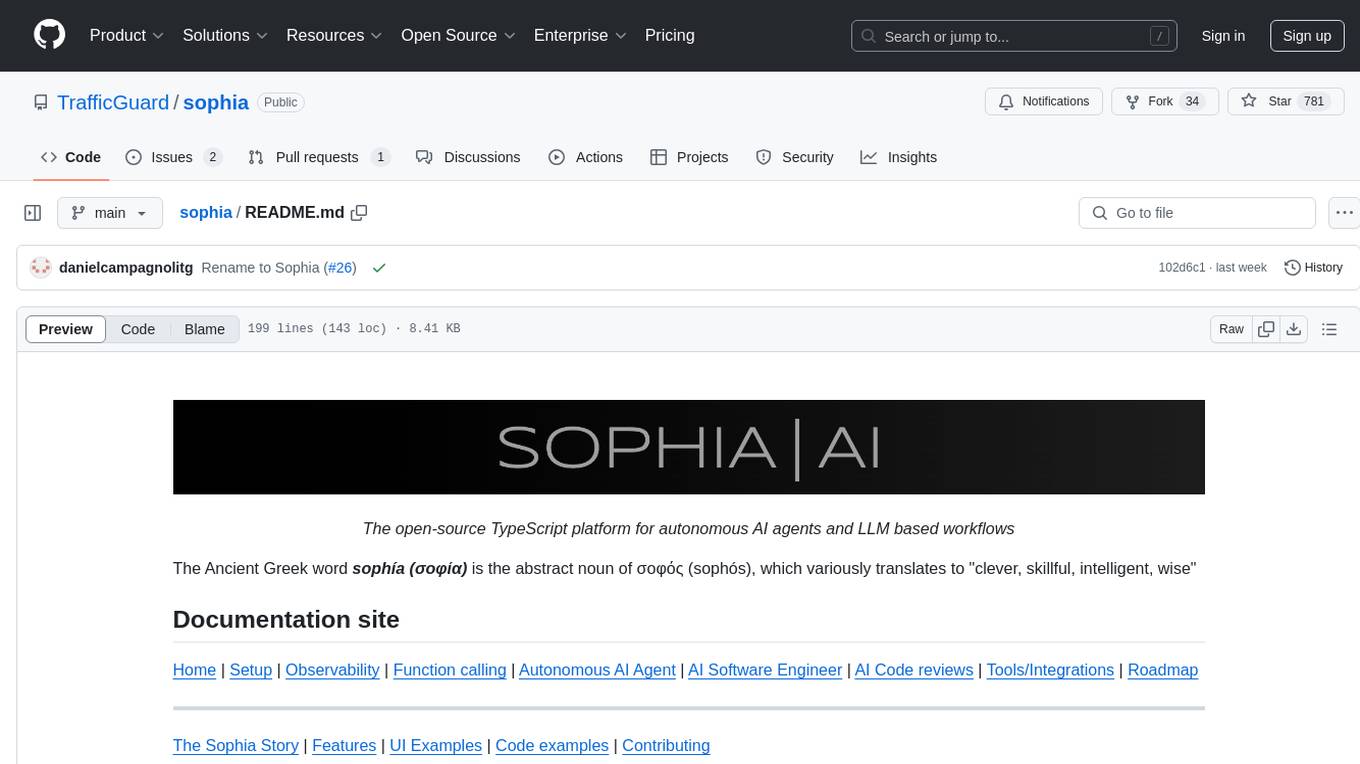
sophia
Sophia is an open-source TypeScript platform designed for autonomous AI agents and LLM based workflows. It aims to automate processes, review code, assist with refactorings, and support various integrations. The platform offers features like advanced autonomous agents, reasoning/planning inspired by Google's Self-Discover paper, memory and function call history, adaptive iterative planning, and more. Sophia supports multiple LLMs/services, CLI and web interface, human-in-the-loop interactions, flexible deployment options, observability with OpenTelemetry tracing, and specific agents for code editing, software engineering, and code review. It provides a flexible platform for the TypeScript community to expand and support various use cases and integrations.
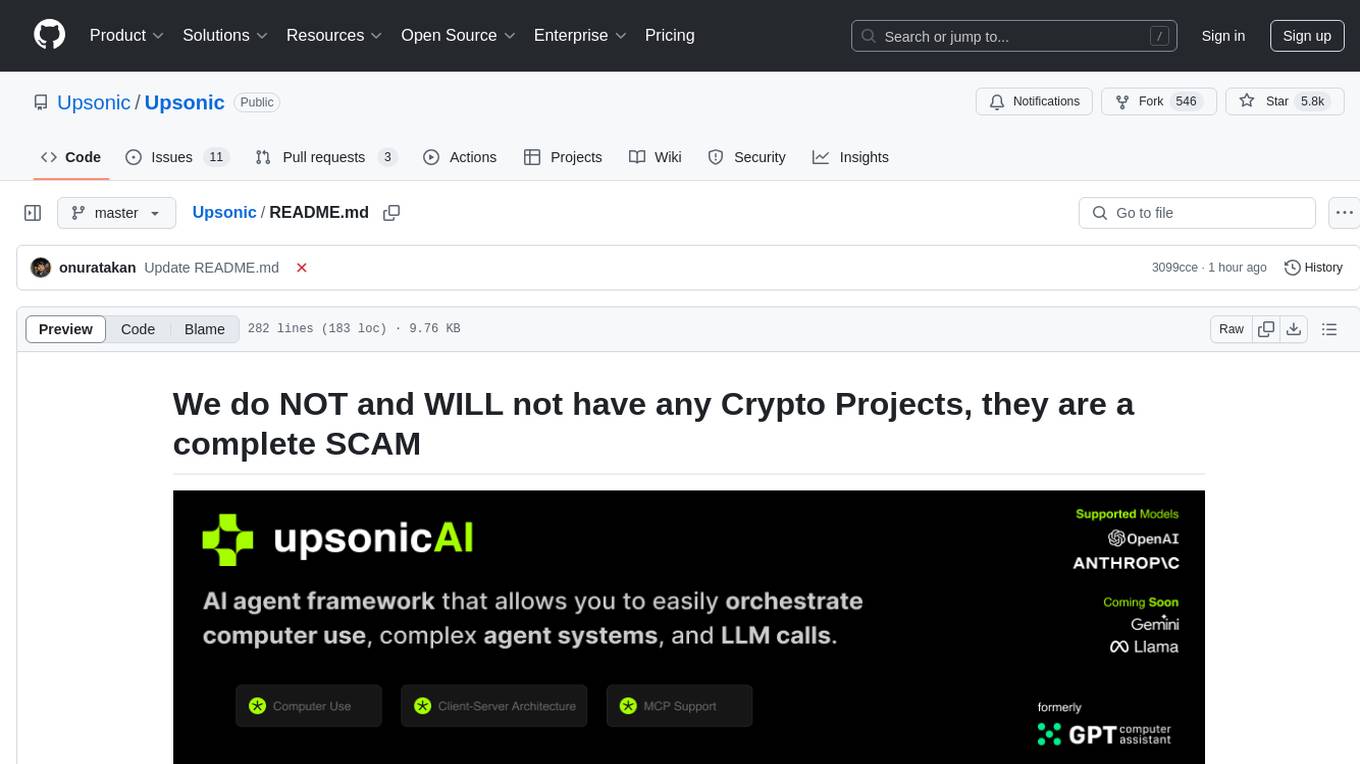
Upsonic
Upsonic offers a cutting-edge enterprise-ready framework for orchestrating LLM calls, agents, and computer use to complete tasks cost-effectively. It provides reliable systems, scalability, and a task-oriented structure for real-world cases. Key features include production-ready scalability, task-centric design, MCP server support, tool-calling server, computer use integration, and easy addition of custom tools. The framework supports client-server architecture and allows seamless deployment on AWS, GCP, or locally using Docker.
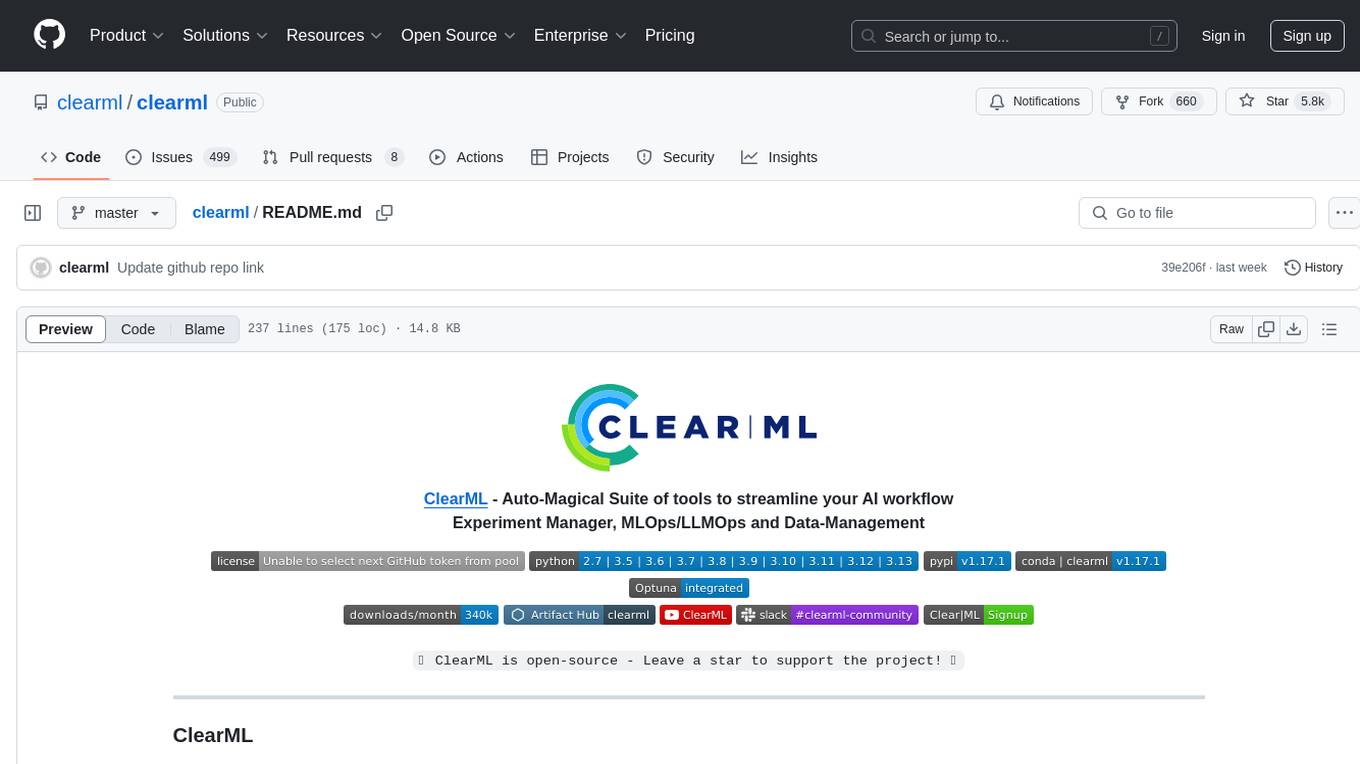
clearml
ClearML is an auto-magical suite of tools designed to streamline AI workflows. It includes modules for experiment management, MLOps/LLMOps, data management, model serving, and more. ClearML offers features like experiment tracking, model serving, orchestration, and automation. It supports various ML/DL frameworks and integrates with Jupyter Notebook and PyCharm for remote debugging. ClearML aims to simplify collaboration, automate processes, and enhance visibility in AI projects.
For similar jobs

Azure-Analytics-and-AI-Engagement
The Azure-Analytics-and-AI-Engagement repository provides packaged Industry Scenario DREAM Demos with ARM templates (Containing a demo web application, Power BI reports, Synapse resources, AML Notebooks etc.) that can be deployed in a customer’s subscription using the CAPE tool within a matter of few hours. Partners can also deploy DREAM Demos in their own subscriptions using DPoC.

skyvern
Skyvern automates browser-based workflows using LLMs and computer vision. It provides a simple API endpoint to fully automate manual workflows, replacing brittle or unreliable automation solutions. Traditional approaches to browser automations required writing custom scripts for websites, often relying on DOM parsing and XPath-based interactions which would break whenever the website layouts changed. Instead of only relying on code-defined XPath interactions, Skyvern adds computer vision and LLMs to the mix to parse items in the viewport in real-time, create a plan for interaction and interact with them. This approach gives us a few advantages: 1. Skyvern can operate on websites it’s never seen before, as it’s able to map visual elements to actions necessary to complete a workflow, without any customized code 2. Skyvern is resistant to website layout changes, as there are no pre-determined XPaths or other selectors our system is looking for while trying to navigate 3. Skyvern leverages LLMs to reason through interactions to ensure we can cover complex situations. Examples include: 1. If you wanted to get an auto insurance quote from Geico, the answer to a common question “Were you eligible to drive at 18?” could be inferred from the driver receiving their license at age 16 2. If you were doing competitor analysis, it’s understanding that an Arnold Palmer 22 oz can at 7/11 is almost definitely the same product as a 23 oz can at Gopuff (even though the sizes are slightly different, which could be a rounding error!) Want to see examples of Skyvern in action? Jump to #real-world-examples-of- skyvern

pandas-ai
PandasAI is a Python library that makes it easy to ask questions to your data in natural language. It helps you to explore, clean, and analyze your data using generative AI.
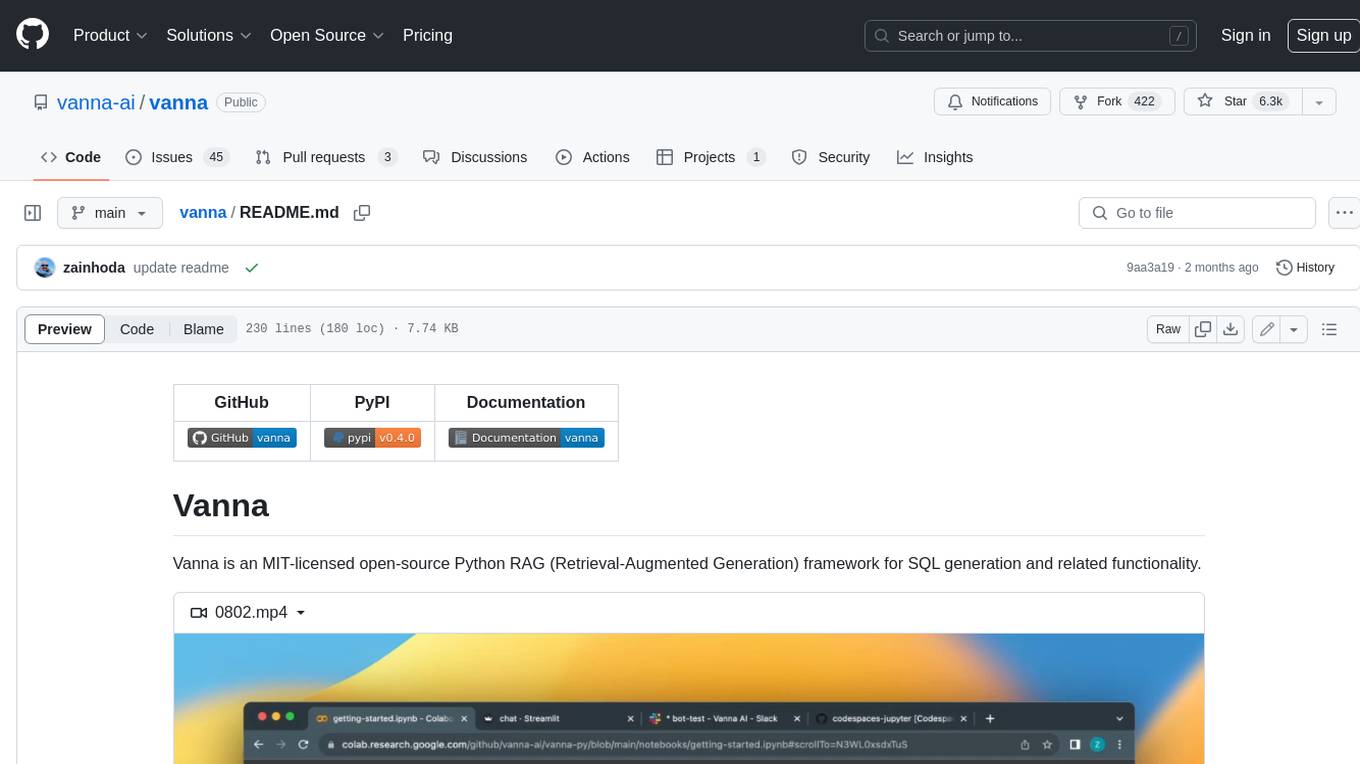
vanna
Vanna is an open-source Python framework for SQL generation and related functionality. It uses Retrieval-Augmented Generation (RAG) to train a model on your data, which can then be used to ask questions and get back SQL queries. Vanna is designed to be portable across different LLMs and vector databases, and it supports any SQL database. It is also secure and private, as your database contents are never sent to the LLM or the vector database.

databend
Databend is an open-source cloud data warehouse that serves as a cost-effective alternative to Snowflake. With its focus on fast query execution and data ingestion, it's designed for complex analysis of the world's largest datasets.

Avalonia-Assistant
Avalonia-Assistant is an open-source desktop intelligent assistant that aims to provide a user-friendly interactive experience based on the Avalonia UI framework and the integration of Semantic Kernel with OpenAI or other large LLM models. By utilizing Avalonia-Assistant, you can perform various desktop operations through text or voice commands, enhancing your productivity and daily office experience.
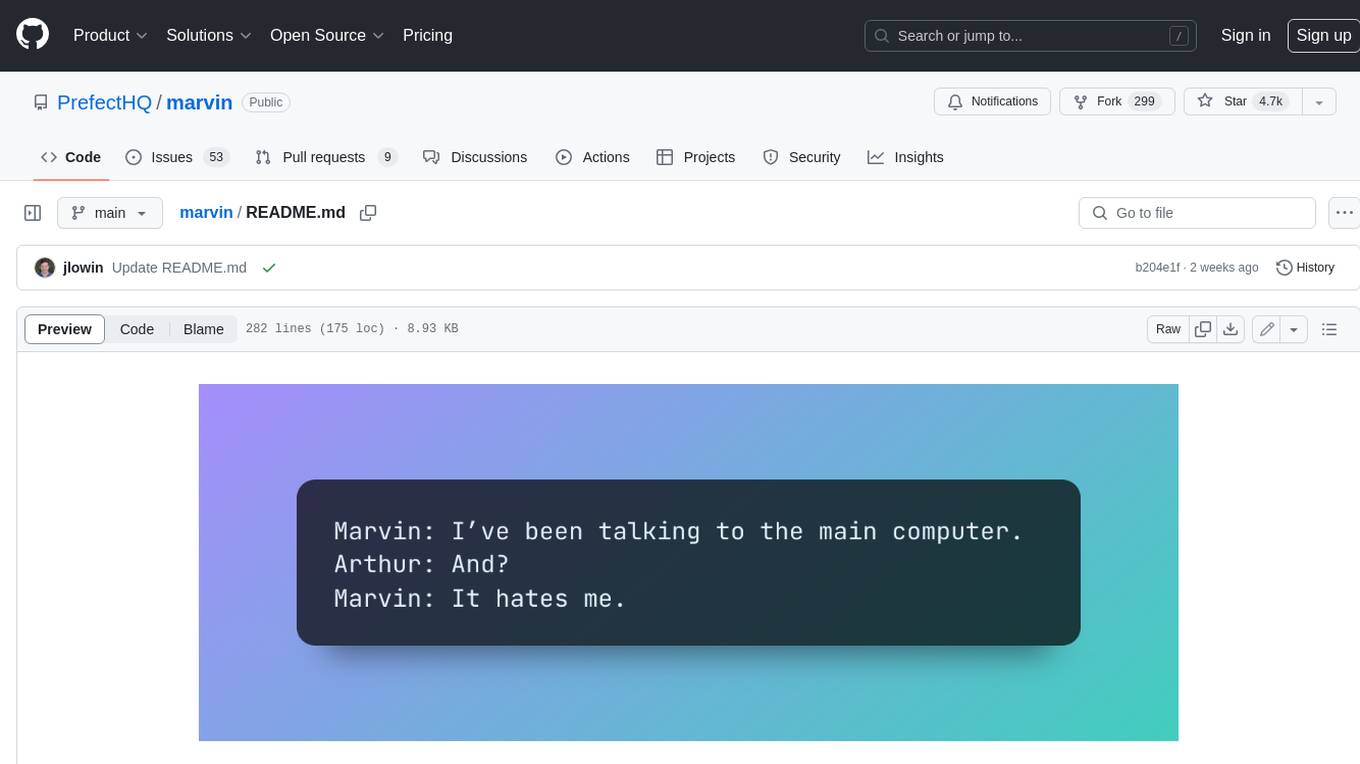
marvin
Marvin is a lightweight AI toolkit for building natural language interfaces that are reliable, scalable, and easy to trust. Each of Marvin's tools is simple and self-documenting, using AI to solve common but complex challenges like entity extraction, classification, and generating synthetic data. Each tool is independent and incrementally adoptable, so you can use them on their own or in combination with any other library. Marvin is also multi-modal, supporting both image and audio generation as well using images as inputs for extraction and classification. Marvin is for developers who care more about _using_ AI than _building_ AI, and we are focused on creating an exceptional developer experience. Marvin users should feel empowered to bring tightly-scoped "AI magic" into any traditional software project with just a few extra lines of code. Marvin aims to merge the best practices for building dependable, observable software with the best practices for building with generative AI into a single, easy-to-use library. It's a serious tool, but we hope you have fun with it. Marvin is open-source, free to use, and made with 💙 by the team at Prefect.

activepieces
Activepieces is an open source replacement for Zapier, designed to be extensible through a type-safe pieces framework written in Typescript. It features a user-friendly Workflow Builder with support for Branches, Loops, and Drag and Drop. Activepieces integrates with Google Sheets, OpenAI, Discord, and RSS, along with 80+ other integrations. The list of supported integrations continues to grow rapidly, thanks to valuable contributions from the community. Activepieces is an open ecosystem; all piece source code is available in the repository, and they are versioned and published directly to npmjs.com upon contributions. If you cannot find a specific piece on the pieces roadmap, please submit a request by visiting the following link: Request Piece Alternatively, if you are a developer, you can quickly build your own piece using our TypeScript framework. For guidance, please refer to the following guide: Contributor's Guide







